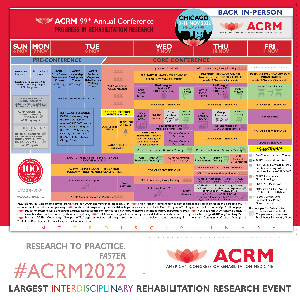Back
Aging Research & Geriatric Rehabilitation
Mitigating Intersectional Anti-Ageism in Physical Rehabilitation
Wednesday, November 9, 2022
12:15 PM – 12:20 PM
Location: Station 3
- AS
Adrianne Smiley, EdD, OTD, OTR/l, n/a
Occupational Therapist
Occupational Therapist
Stonecrest, Georgia, United States
Presenting Author(s)
Objective(s): Investigate the psychosomatic associations between ageism and health outcomes; Convey and emphasize the consequences of ageism as a persisting, implicitly institutionalized philosophy that remains to be solved; Posit advocacy as a professional imperative and frontier strategy to mitigate ageism; Emphasize and inspire future research in support of the needs of the aging population.
Data Sources: A robust literature search of databases and journals including PubMed, Taylor and Francis Online, American Public Health Association, Occupational Therapy in Healthcare, American Journal of Occupational Therapy, Physical & Occupational Therapy in Geriatrics, EBSCO, Cochrane Database of Systematic Reviews. Indexing terms included "ageism", "elder discrimination", "ageism" and "advocacy", "ageism index".
Study Selection: Eligible studies were those 1) written in English 2) published in 2010 or later 3) conducted in the United States 4) discussed a proposed intervention for ageism 5) used qualitative and/or quantitative design. The blind review evaluative technique was used to assess the quality of the research. A dual independent review of search results by two reviewers comprised this study.
Data Extraction: The research was assessed by two independent raters via random assignment. Webs of causation theory and Hill's Criteria for causation were used to assess causal inference. Disagreements were resolved through consensus with a third reviewer.
Data Synthesis: Ageism led to significantly worse health outcomes in 95% of the studies and 70% of the studies posited advocacy as a proposed solution.
Conclusions: Outcomes reveal the significance of ageism and emphasize age-based discrimination as a critical hindrance to optimal healthcare outcomes. The aging population often experiences socialized and institutionalized discrimination based on age resulting in poorer health outcomes. The conventional, positivist approach to clinical treatment and innovation may not be aligned with the needs of the aging population. Ageism within the current paternalistic medical model has led to a healthcare crisis; patients do not feel inherently valued by their medical providers.
Author(s) Disclosures: There are no financial agreements or conflicts of interest with this presentation.
Data Sources: A robust literature search of databases and journals including PubMed, Taylor and Francis Online, American Public Health Association, Occupational Therapy in Healthcare, American Journal of Occupational Therapy, Physical & Occupational Therapy in Geriatrics, EBSCO, Cochrane Database of Systematic Reviews. Indexing terms included "ageism", "elder discrimination", "ageism" and "advocacy", "ageism index".
Study Selection: Eligible studies were those 1) written in English 2) published in 2010 or later 3) conducted in the United States 4) discussed a proposed intervention for ageism 5) used qualitative and/or quantitative design. The blind review evaluative technique was used to assess the quality of the research. A dual independent review of search results by two reviewers comprised this study.
Data Extraction: The research was assessed by two independent raters via random assignment. Webs of causation theory and Hill's Criteria for causation were used to assess causal inference. Disagreements were resolved through consensus with a third reviewer.
Data Synthesis: Ageism led to significantly worse health outcomes in 95% of the studies and 70% of the studies posited advocacy as a proposed solution.
Conclusions: Outcomes reveal the significance of ageism and emphasize age-based discrimination as a critical hindrance to optimal healthcare outcomes. The aging population often experiences socialized and institutionalized discrimination based on age resulting in poorer health outcomes. The conventional, positivist approach to clinical treatment and innovation may not be aligned with the needs of the aging population. Ageism within the current paternalistic medical model has led to a healthcare crisis; patients do not feel inherently valued by their medical providers.
Author(s) Disclosures: There are no financial agreements or conflicts of interest with this presentation.
Learning Objectives:
- Upon completion, participants will be able to identify and develop solutions to reduce and eradicate ageism in the healthcare environment
- Upon completion, participants will be able to determine and analyze their own attitudes toward ageism.
- Upon completion, participants will be able to identify the mechanisms of ageism in the healthcare environment

.jpg)
